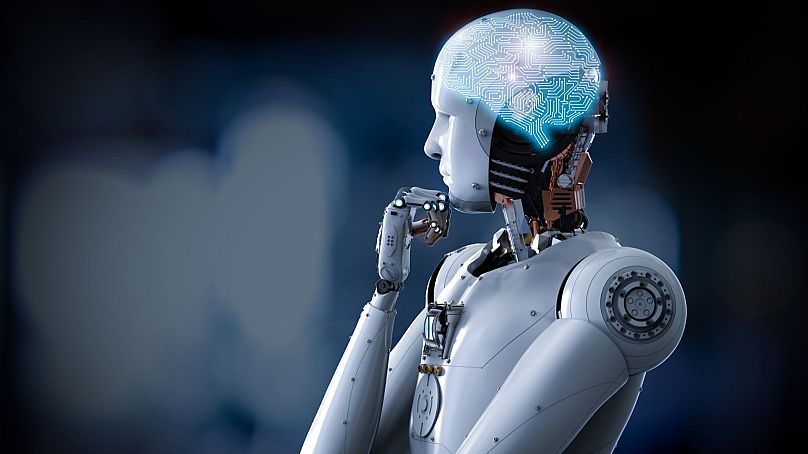Creative professionals en masse are under threat from machines for the first time.
The year began quietly for Alejandro Graue.
The Argentinian voice-over and dubbing actor was looking forward to working on several projects. In one, he was hired to dub in Spanish for a YouTube channel with millions of subscribers.
Graue had been working on this project since November and he had refused other jobs as this one required a lot of effort.
But, after a short holiday break, everything went south. While watching YouTube, he saw that the channel had uploaded a new video in Spanish.
"I thought it was weird because they hadn't called me to record it yet," he told Euronews.
When he pressed play and listened to the recording, he was shocked. The voice had been generated by artificial intelligence.
"It was an automated voice, it had no richness, no nuance, no rhythm. The pronunciation was totally mechanical," said Graue.
In just a few months, AI has shaken up the job market, with thousands of spooked professionals wanting the technology curbed or regulated. The 36-year-old Argentinian actor is one of them, as he fears it will end his career.
"Hearing that artificial voice on the video had a huge impact on me. I fear for my future. Dubbing has been my job for the last 18 years and I have two small daughters now," says Graue.
He emailed the company after watching the video and they confirmed they didn’t need him to dub the voice.
“I can’t count on that money anymore. Now I fear losing all the projects I’m working on."
Within weeks of uploading the AI-generated videos, YouTube users began to complain. They found the voice "horrible" and felt it was difficult to understand.
"This has certainly had an impact because the channel deleted the last videos made with artificial voice, but so far I have not yet been contacted to work on this again," Graue told Euronews.
The actor believes the software used had to be a free or low-cost one since "the sound quality was very bad".
His remarks open another aspect of the debate: Whether cost-saving companies can swap manpower for artificial intelligence, without sacrificing something else.
However, he added: "What is indisputable is that we will never be able to compete with it in terms of time. You give this technology a script and within five minutes you have it processed and voiced. The only thing left is to do a final check."
Double-edged sword
Despite the uncertainty, there is still no clear position on how artificial intelligence will affect human jobs, plus many experts question if the feared mass replacement will actually happen.
"Like any technological advance, it has a double edge. It can be extremely useful and also cause problems," Guillermo Simari, professor of Artificial Intelligence and Computational Logic at the Universidad Nacional del Sur de Bahía Blanca in Argentina, said.
"Even so, in the foreseeable future, this technology is not expected to replace all jobs."
For him, there’s nothing new in the process of replacing people with machines, as it is a common pattern repeated throughout history. The first example is the invention of the car.
"If we had asked people back then what they wanted before the automobile was invented, the answer would have been faster horses. Many people lost their jobs, but they found complementary ones."
The problem nowadays is that the risk is bigger. AI no longer replaces physical jobs, but also intellectual tasks - ones that until now were only performed by the human brain.
For the first time in history, creative professionals en masse are threatened and could see their work done by machines.
"If this technology is free to use, they can work with synthetically created voices and take over every broadcasting job without paying people, as there’s no copyright", says the Argentinian actor.
"When having a look at the labour market, thousands of jobs could be lost from one day to the next, amongst them voice-over artists and illustrators", he adds.
From specialisation to generalisation
The question many experts are asking is to what extent should society accept the mass automation of all jobs?
For both Graue and Simari, the ideal future would be for human beings and artificial intelligence to be able to complement one another when working.
"One cannot try to keep existing jobs. What we have to do is educate society so that it can adapt to change in the most effective way possible," says Simari.
"In the last 100 years, there has been a race towards specialisation of knowledge. We will have to shift towards generalisation of knowledge instead of this specialisation," he adds.
At the moment, the Argentinian actor is looking for new projects to continue doing the job he loves.
He has nothing against the YouTube channel that decided to replace his voice with an artificial one, but he does call for regulation.
"At the very least, we have to try to use artificial intelligence for our benefit, so that it improves our work instead of replacing us."












